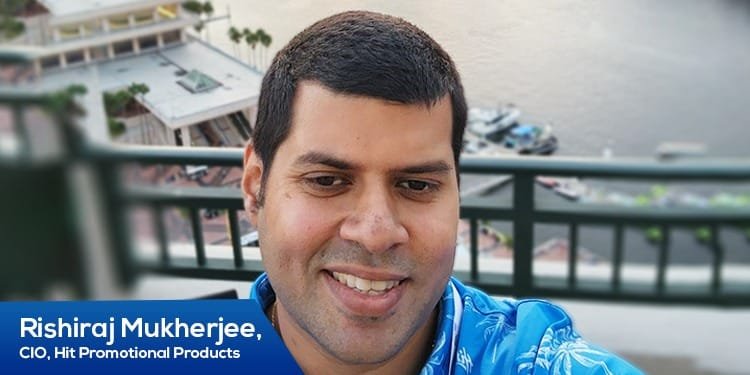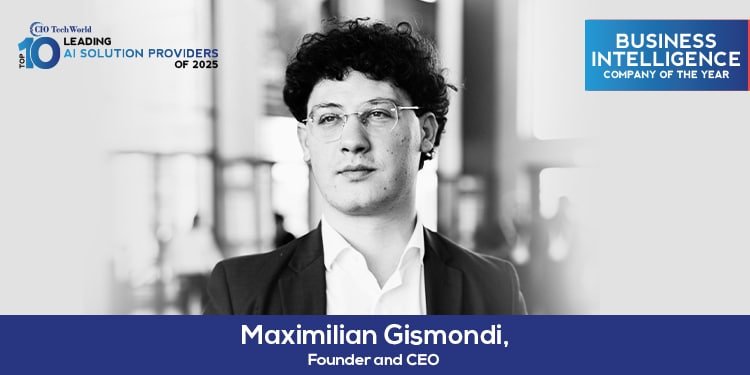Rishiraj Mukherjee’s path to becoming a CIO at Hit Promotional Products is a testament to his unwavering dedication and passion for technology. His journey began during his high school days in Kolkata, India, where he first discovered his fascination with electronics. As he pursued his undergraduate degree in Electronics, the world of computer programming opened its doors to him, igniting a newfound curiosity.
During this time, Mukherjee embarked on a groundbreaking project focused on face recognition. Little did he know that this endeavor would ultimately lead him on a journey to the opposite side of the globe, where he would pursue a master’s degree at the prestigious University of South Florida (USF) in Tampa.
Mukherjee’s career took an exciting turn at Hit Promotional Products, where he began as a software developer. Driven by his passion for data science, he pursued further learning by enrolling in the weekend executive program on Business Analytics at USF. Simultaneously managing multiple projects at the company, his experiences were instrumental in his rapid advancement from software developer to integration team lead, Vice President of IT, and ultimately Chief Information Officer (CIO).
Let’s explore Rishiraj Mukherjee’s remarkable journey as it is a testament to his relentless pursuit of knowledge, his ability to leverage diverse experiences, and his unwavering commitment to excellence.
Describe your career progression from the start to where you are and what were pivotal decisions, moves you made, circumstances, and other facts that facilitated your growth.
I would begin my journey from my high school days in Kolkata, India. I consider myself fortunate as I was among the few who had the opportunity to pursue statistics as a specialization during my 11th and 12th grades. Merely gaining admission required being among the top percentile in terms of academic performance. This experience instilled in me the importance of embracing competition and dedicating countless hours of hard work.
Soon after, while pursuing my undergraduate degree in Electronics, I was introduced to the world of computer programming. This exposure eventually led me to undertake a project focused on face recognition. Although the code for face recognition now may be condensed to a few lines using CNN, back then, it required hundreds of lines of code in C, involving matrix manipulation and more.
This project became a stepping stone toward my master’s degree at the University of South Florida (USF) in Tampa, where I had the opportunity to conduct my thesis on speech recognition. During my time at USF, I served as a Teaching Assistant for Dr. Moreno, who played a pivotal role in helping me secure my first job at a startup company specializing in software-based video visitation for inmates.
The two years I spent at the startup allowed me to acquire a diverse skill set, including proficiency in C, Java, web services, PHP, Android, and Arduino. The speed and expertise in software development that I gained during this period greatly influenced my career trajectory and contributed to my advancement at Hit Promotional Products.
At Hit, I was fortunate to collaborate with the PromoStandards initiative through my boss, who was the CIO at the time. This involvement enabled me to spearhead numerous integration projects, granting me visibility within the organization, including exposure to the CEO. Additionally, I nurtured my interest in data science and acquired skills in this domain by attending the weekend executive program on Business Analytics at USF while simultaneously managing various Hit projects.
The combination of these experiences eventually led me to secure the role of Vice President of IT, followed by the position of Chief Information Officer (CIO) within a year.
What are the key skills and qualifications that aspiring tech executives in the tech industry should focus on developing to enhance their career prospects?
I consider DevOps, AI/ML, back-end development, infrastructure, networking, cybersecurity, finance, and project management to be highly valuable skills. These areas of expertise enable a comprehensive understanding of how software solutions can create significant business impacts. Possessing knowledge in these domains allows for the development of scalable solutions that deliver added value to the organization.
What are some key milestones or achievements that tech executives should aim for at various stages of their careers to demonstrate their growth and readiness for higher-level roles?
One thing I’ve observed is that if you’re a skilled problem solver, the business tends to gravitate toward you. In the initial stages, my main focus was completing projects and delivering value to the organization. Over time, this should naturally progress to being involved in higher-level decision-making processes. If this progression is not happening, it’s important to reassess the impact you’re making on the business. A reliable metric for evaluating your performance as an employee, leader, and mentor is the level of comfort and trust your co-workers have in you when it comes to making critical decisions.
How important is it for tech executives to actively seek out mentorship or coaching opportunities to advance their careers? What benefits can they derive from such relationships?
Tech executives should always seek mentorship from individuals who offer different perspectives or possess more experience. As executives, we often make decisions based on our understanding of the problem, the business, and the relevant metadata. It is valuable to have someone in our network who has faced similar situations and can provide insights or offer alternative viewpoints. Diversifying the range of opinions is consistently advantageous and can contribute to better decision-making.
In your experience, what role does professional networking play in the career progression of tech executives? How can tech executives effectively build and leverage their networks?
I strongly believe that this aspect plays a crucial role. Collaborating with peers and actively networking enables you to gather a plethora of ideas, tools, and discussion points that you can bring to the table within your own organization. Additionally, in many cases, having a personal connection with the CTO of a company you are trying to integrate with can make it easier to resolve issues or negotiate through a face-to-face meeting, as opposed to relying solely on numerous emails. Moreover, establishing such connections can provide greater influence and facilitate problem-solving for common industry issues.
Are there any specific certifications, advanced degrees, or executive education programs that can significantly enhance the career prospects of tech executives in the tech industry? Which ones would you recommend?
I believe that currently, pursuing an advanced degree in either machine learning or cybersecurity is absolutely essential. Additionally, having knowledge in finance and project management is also crucial.
Can you share any examples of notable tech executives who have successfully transitioned from one role (e.g., CIO) to another (e.g., CEO) within the same organization or industry? What factors contributed to their success?
My current boss is the President at Hit, and he attained that position by being a successful CIO within our organization and the industry. His ability to integrate technology with business processes played a crucial role in his career advancement, ultimately leading him to oversee the entire business. This highlights the importance of technology in shaping the future of most organizations.
How important is it for tech executives to cultivate a personal brand and establish thought leadership within the industry? What are some effective ways for tech executives to showcase their expertise and gain visibility?
It is crucial to be part of industry organizations and work groups as it provides an excellent opportunity to align your skills with the industry’s needs. This involvement not only helps you leverage your expertise but also enables you to establish brand recognition. Valuable contributions to the industry will always be acknowledged and appreciated, further enhancing your professional reputation.
Lastly, what advice would you give to aspiring tech executives who are looking to accelerate their career progression and make a lasting impact in the tech industry?
I would prioritize education, consistently striving to stay updated with the latest technology trends. Additionally, building strong relationships with business units within your organization and actively participating in industry work groups would be essential. These actions would contribute to expanding your knowledge, staying relevant in the field, and fostering valuable connections that can drive professional growth.

As a visionary Business and Technology Leader, I bring a proven track record of driving innovation, fostering collaboration, and delivering exceptional results in fast-paced and dynamic environments. I have honed outstanding skills in articulating a compelling vision and rallying active support from internal executives, development teams, and client business and IT leadership. I am proud to be a member of both the Forbes Technology Council and HITEC (Hispanic Technology Executives Council), which underscores my commitment to being at the forefront of industry trends and developments.
My special talent is demonstrating value to clients at all touch points – I instill these concepts in my teams.









